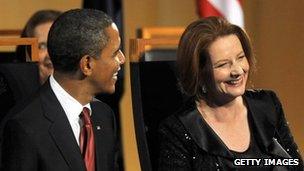As China rises, America responds
- Published
- comments

"I have said repeatedly and I will say again today that we welcome a rising, peaceful China" - the words of America's president as he arrived in Australia.
"I think the notion that we fear China is mistaken. The notion that we're looking to exclude China is mistaken," Barack Obama added.
But his current trip to Asia has one overriding theme: the reassertion of American power and American influence in Asia in the face of China's rise.
President Obama is clearly signalling to both China and its neighbours that the United States is not about to cede ground to its new rival. China is extending its economic and military reach, and America is moving to counter that.
The US knows that China's neighbours are being drawn into deeper economic relationships with Beijing. But many are also wary of China's growing military strength and its increasing assertiveness, whether over territorial rights in the South China Sea, trade or other disputes.
So the US sees an opportunity to build ties with nations concerned about what sort of power China will be.
At the Apec summit in Hawaii last weekend President Obama pressed his idea of a Trans-Pacific Partnership (TPP), a free trade area that will champion open markets where private and state-controlled firms compete on equal terms.
China's neighbours like Vietnam, Malaysia and Brunei will be in the TPP along with other Pacific Rim states. China, with its heavily state-controlled economy, is pointedly not a part of the plan unless it changes its ways.
Projecting power
If Hawaii showcased how the US wants to respond to the economic challenge, Australia is where Mr Obama has shown how he wants to deal with the military challenge.
The US is deepening its alliance with Australia. Some 2,500 US marines are going to be deployed to Darwin, at Australia's northernmost tip, and more US aircraft are going to be rotating through Australian bases.
American troops already operate in South Korea, Japan, Guam and the Philippines. Now they'll have another foothold in Asia, spreading their reach, and positioning US forces a little further away from Chinese missiles.
The message is that America is ensuring it is strategically poised to project power over the vital trade routes that pass through the South China Sea, and it wants to reassure its partners in Asia it is cementing that position.
At both the Apec summit and in Australia President Obama had the same message for Beijing. "With China's rise comes increased responsibility, they have to play by the rules, in fact they have to underwrite the rules," he said.
"Where China is playing by those rules, recognising its role, I think this is going to be a win-win situation. They have to respect the rules and responsibilities that come with being a world power."
Shadow boxing
The creation of the TPP and the new military ties with Australia are small but symbolic steps.
With both Mr Obama is trying to deliver the same message, that China can follow "the rules", co-operate with regional powers and its rise will be welcome, or flout "the rules" by what he has called "gaming the system" and find itself increasingly outside US-backed regional partnerships.
Liu Weimin, a spokesman for Beijing's Ministry of Foreign Affairs, responded by saying that China stands for "peaceful development and co-operation".
"China has its own concepts of friendly cooperation with all countries," Mr Liu said. "Put simply, the path of peaceful development to achieve the shared aspirations of the international community."
But he questioned the new US military ties with Australia saying "whether strengthening and expanding a military alliance is in the interests of the region or the international community is worthy of discussion," especially at a time of global economic turmoil.
Other voices in China have been far more bellicose in their response to America's new Asian assertiveness.
The English-language Global Times, a newspaper produced by the Communist Party-controlled People's Daily group, warned Australia about the dangers of trying to have China as its biggest trading partner but at the same time having a military alliance with the US to keep China in check.
"One thing is certain," the paper said, "if Australia uses its military bases to help the US harm Chinese interests, then Australia itself will be caught in the crossfire."
And Luo Yuan, a senior officer at the People's Liberation Army's Academy of Military Sciences, told the paper that while neither the United States or China desire to start a war, "if China's core interests such as its sovereignty, national security and unity are intruded on, a military conflict will be unavoidable".
That's tough talk, but it's exactly the sort of aggressive tone which is alarming China's neighbours and making them more receptive to America's overtures.